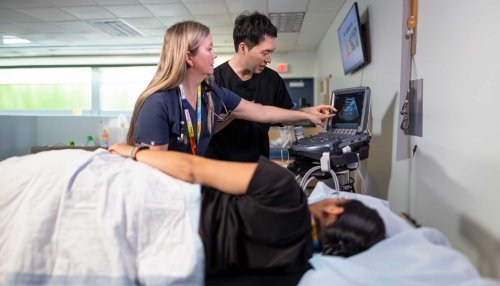The 36-month Doctor of Nurse Anesthesia Program (D.N.A.P.) Entry into Practice consists of three phases.
- The first phase (3 quarters) is entirely online allowing students to remain at their home residence and possibly continue working as a registered nurse. This online phase introduces students to topics such as professional development, leadership, research methods, and healthcare policy.
- The second phase (4 quarters) will begin a face-to-face didactic experience providing the student with a strong foundation in the basic sciences upon which the student will build a framework of basic and advanced principles of anesthesia practice, pharmacology, and related psychomotor and decision-making skills. All coursework in the first two phases of the program must be completed before starting the third phase of the program.
- The third phase (5 quarters) encompasses the clinical practicum, board preparation study, and a research-based scholarly project related to anesthesia. The clinical phase provides students with the necessary hands-on experience to develop the knowledge, skills and attitudes essential to the practice of nurse anesthesia in a variety of practice settings.
- All students will be considered for rotation to clinical sites in Arizona, Arkansas, California, Colorado, Florida, Louisiana, Montana, Nevada, New Mexico, Ohio, Texas, Utah, Washington state, and all available clinical locations. Thus, a student may be assigned to rotations in any combination of these states as needed to ensure the best quality set of clinical experiences.
- Students must make their own arrangements for transportation and lodging at these clinical sites. The University does not provide for the cost of transportation or lodging.
- These sites will provide students with a broad scope of experiences in rural, urban, and suburban hospitals, as well as specialty rotations in cardiac surgery, pediatrics, and obstetrics.
Learn More
Learn more about the requirements and find quick links to relevant information to guide you in your decision-making process.
To be considered for admission to the Doctor of Nurse Anesthesia Entry into Practice Program at Midwestern University, students must submit the following documented evidence:
- Completion of a baccalaureate degree in nursing, granted by a regionally accredited U.S. college or university.
- Minimum cumulative grade point average (GPA) of 3.00 on a 4.00 scale and minimum science GPA of 3.00 on a 4.00 scale. Courses included in the calculation of the science GPA include any anatomy, physiology, pharmacology, chemistry, physics, and microbiology courses.
- Satisfactory completion (grades of C- or better) of prerequisite courses in anatomy and physiology (8 total semester hours; 12 quarter hours) and one course in general chemistry (3 semester hours; 4 quarter hours).
- Licensure to practice as a registered nurse: an unrestricted license to practice in at least one legal jurisdiction in the United States or its territories. The applicant possesses no previous sanctions or restrictions on the RN license.
- Minimum of 1-year critical care experience prior to the interview process. Critical care experience includes all types of Adult ICU, Pediatric ICU, and Emergency Room. Neonatal intensive care unit experience does not meet this requirement. Experience should include management of mechanical ventilation, invasive monitoring, and vasoactive medication infusions.
*Subject to change
The 36-month Doctor of Nurse Anesthesia Program consists of three phases.
- The first phase (3 quarters) is entirely online allowing students to remain at their home residence and possibly continue working as a registered nurse. This online phase introduces students to topics such as professional development, leadership, research methods, and healthcare policy.
- The second phase (4 quarters) will begin a face-to-face didactic experience providing the student with a strong foundation in the basic sciences upon which the student will build a framework of basic and advanced principles of anesthesia practice, pharmacology, and related psychomotor and decision-making skills. All coursework in the first two phases of the program must be completed before starting the third phase of the program.
- The third phase (5 quarters) encompasses the clinical practicum, board preparation study, and a research-based scholarly project related to anesthesia. The clinical phase provides students with the necessary hands-on experience to develop the knowledge, skills and attitudes essential to the practice of nurse anesthesia in a variety of practice settings.
- All students will be considered for rotation to clinical sites in Arizona, Arkansas, California, Colorado, Florida, Louisiana, Montana, Nevada, New Mexico, Ohio, Texas, Utah, Washington state, and all available clinical locations. Thus, a student may be assigned to rotations in any combination of these states as needed to ensure the best quality set of clinical experiences.
- Students must make their own arrangements for transportation and lodging at these clinical sites. The University does not provide for the cost of transportation or lodging.
- These sites will provide students with a broad scope of experiences in rural, urban, and suburban hospitals, as well as specialty rotations in cardiac surgery, pediatrics, and obstetrics.
*Subject to change
The Doctor of Nurse Anesthesia Practice Program at Midwestern University begins with providing students with a solid foundation in leadership, healthcare policy, research, and professional development. Then the student builds upon previously acquired knowledge in the basic sciences and introduces the practice of nurse anesthesia.
The clinical practicums challenge students to apply knowledge gained in the classroom to actual administration of anesthesia under the guidance of Certified Registered Nurse Anesthetists (CRNAs) and anesthesiologists at multiple clinical sites in the region.
Upon successful completion of the program, graduates will be able to work in a variety of settings including urban and rural hospitals, same-day surgery centers, doctors' offices, and pain clinics.
The program is also committed to providing students with the knowledge and skills necessary to participate in scholarly work that will contribute to their body of knowledge and provide evidence to improve healthcare delivery to all populations.
- Male: 17 (47%)
- Female: 19 (53%)
- Average age: 30
- Average overall GPA: 3.67
- In-State: 53%
- The program has 100% employment for graduates.
- The program had 94% first-time pass rate.
- Attrition for the 2025 cohort was 6%.
The Council on Accreditation of Nurse Anesthesia Educational Programs (COA) required that all students matriculating into a nurse anesthesia educational program on January 1, 2022 or thereafter be enrolled in a program approved by the COA to award an entry-into-practice doctoral degree. After receiving approval from the COA, Midwestern University’s Nurse Anesthesia Program admitted its first Entry-into-Practice Doctor of Nurse Anesthesia Practice cohort in the fall quarter of 2021.
The Nurse Anesthesia Program received full 10-year accreditation from the Council on Accreditation of Nurse Anesthesia Educational Programs (COA) in October 2021. Accreditation was granted for the period of October 12, 2021 through October 31, 2031. For information regarding this accreditation, contact COA, Council on Accreditation of Nurse Anesthesia Educational Programs, 10275 W. Higgins Rd. Suite 906, Rosemont, IL 60018-5603; phone: 224-275-9130.
The State of Arizona Board of Private Postsecondary Education has approved all current degree programs at the Glendale Campus of Midwestern University.
Midwestern University is accredited by The Higher Learning Commission (HLC), 230 South LaSalle Street, Suite 7-500, Chicago, IL 60604-1413.
Academic Course Catalog
Explore details regarding your specific College/Program (subject to change).
Hear Our Stories
Vincent Ford, D.N.A.P., CRNA, Assistant Professor, Nurse Anesthesia
"Midwestern separates itself in three ways: interdisciplinary approach, faculty, and the training."
College Stats
Growth Rate for Jobs
Jobs are expected to grow by 7%.
Average Salary
Average salary is $143,870 - $227,160 according to the U.S. Bureau of Labor Statistics (2022).
First Time Pass Rate for NCE Exam
Doctorate Program 2025


